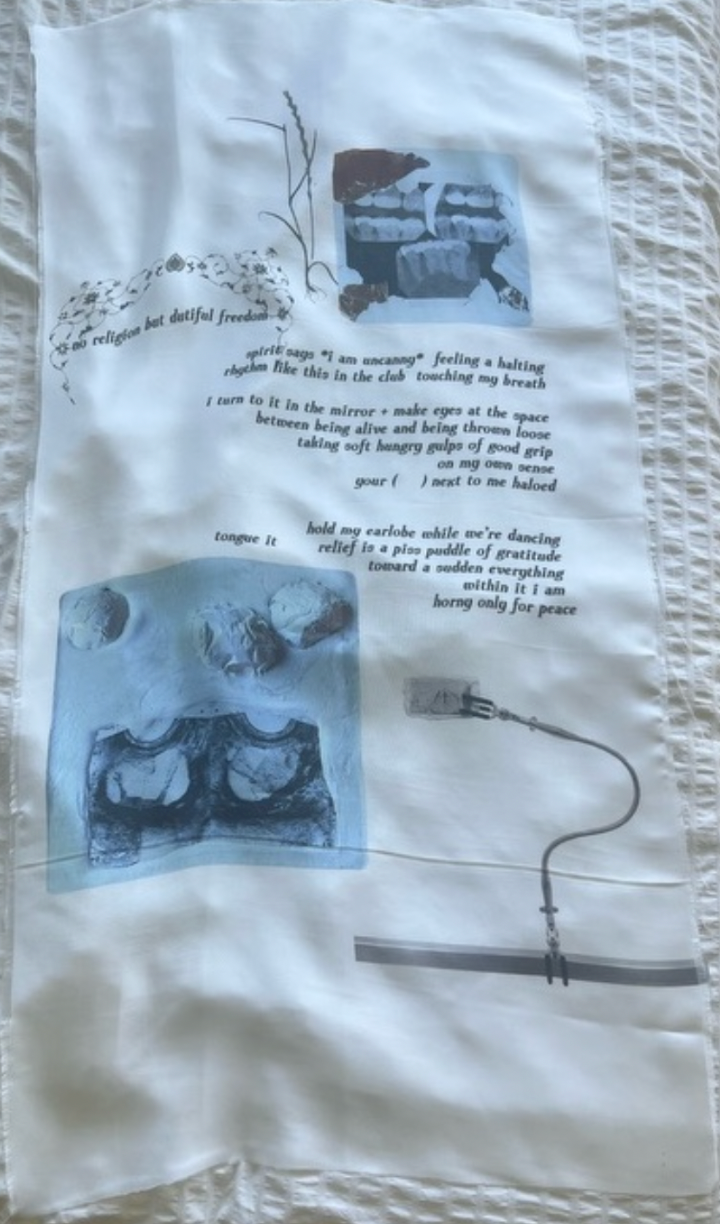
Remnants/ Relics/ Residue - Leena Joshi - no religion but dutiful freedom
Abrams Claghorn Shop
Regular price
$260.00
Sale
leena joshi
no religion but dutiful freedom - 2023
Digital print on silk
3.5 x 2 ft
$260
leena joshi is an artist, poet, and educator. Working across multiple mediums and disciplines, their work engages the digital, fragmentary, and speculative as spaces to explore an expansive, shifting definition of personhood in the margins. leena’s poetry and written work can be found in SFMoMA’s Open Space, baest: a journal of queer forms and affects, Berkeley Poetry Review, and TAGVVERK, among others. They hold a BA in Creative Writing and Gender Studies from the University of Washington, Seattle and an MFA from the University of California, Berkeley's department of Art Practice.
Leading into Being
I can describe to you the jpeg fragments I have on my desktop at this moment: a screen-grabbed scrap of poem from a word processing document, a partial portrait of myself and a friend I cherish during a Zoom call as they showed me new work, a carefully doctored UC Berkeley tuition statement proving I am still enrolled as a student (I am not) and subsequently submitted to Spotify to receive the student discount for another calendar year, and three stills from the 1995 Maria Maggenti film The Incredibly True Adventure of 2 Girls in Love. Swimming in brain fog and the permanent urgency of remembering, memories in my mind feel increasingly like the pregnancy of a copy without a paste, a cursory hover of information threatening to be lost as soon as something else enters my mind’s buzzing field. These momentary media of glitched 3D meshes, a Zoom expression, embedded songs within chains of emails–all begin to feel more accessible, and more real–than memory itself.
Within my tacit sphere of digital media use I ritually collect moments as they happen on screen as easily as I collect memories with my mind. I am attached to these piecemeal digital scraps, both materially (taking up cloud and harddrive space) and figuratively. This accumulated mass of images becomes a space of reflection. There is a therapeutic and creative charge in knowing that I can return to review my digital proxy-memory when I am less exhausted, more present, and in moments of recovery from the fugue state of capitalist extraction and the demand to always be producing something new. This cache of digital fragments from across my life offers me a site to re-process and reexamine memory matter outside the bounds of institutional mandates of time, production, and expectation. In these cement tablets I crystallize my own erosion - the rot and cavities I can’t reverse, the inflammation and cysts that swell around stored traumas, the gentle tools and touches that remind me I can always care for myself and others. I embed them into cement, sink other tokens and talismans of memory matter nearby, and bake other bodies to stand in for my body’s old memories, grounding them from oblivion.
